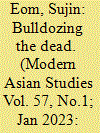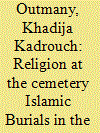| Srl | Item |
| 1 |
ID:
191118


|
|
|
|
|
| Summary/Abstract |
This article looks at lawsuits surrounding two Chinese cemeteries in the mid-twentieth century South Korean cities of Incheon and Seoul as crucial sites to examine the post-colonial legal construction of national citizenry based on property rights. While different legal rationales were employed in each case, the two Chinese cemeteries were relocated to the periphery of each city as a consequence of the litigation. In Incheon, it was argued that the cemetery was owned by Chinese nationals whose land rights were ambiguous and hence open to question, both during the colonial and post-colonial period. On the other hand, in Seoul, rights to the cemetery were at stake due to its association with Japanese nationals, whose holdings were regarded as ‘enemy properties’ in the post-colonial years. Not only were the lawsuits symbolic events that foreshadowed the displacement of Chinese residents from what was considered to be Korea's national land, they also revealed an operative ambiguity in the post-colonial legal system, readily exploited as a tool for discrimination. Drawing upon an analysis of these cases, I argue that the Chinese cemeteries served as a reminder that uncertainty and ambiguity were on tap in the legal workings of post-colonial society, manifested in blunt efforts to define its legitimate members and dictate who is entitled to be buried within a nation's borders.
|
|
|
|
|
|
|
|
|
|
|
|
|
|
|
|
| 2 |
ID:
145669


|
|
|
|
|
| Summary/Abstract |
Death, dying, and burial are not only matters restricted to the experiences and emotions of an individual, but also social events. The rituals that accompany these events are central to the identities and meanings that groups construct for themselves. They can be viewed as windows that open out onto the ways societies view themselves and the world around them (Gardner, Journal of Ethnic and Migration Studies 24: 507–521, 1998). One of the themes this article takes up is that of the enforcement of legal and religious regulations with regard to death and burial among Muslims in the Netherlands and Belgium. If the practice of burial rituals and regulations is used as a “window,” this opens the way to make an elaboration of the established fact that the choice of where to be buried is not only a matter of being well informed about all the practical, legal, and religious possibilities and impossibilities. It is also (or maybe more so) a matter of how Muslims view themselves and the society of which they are part.
|
|
|
|
|
|
|
|
|
|
|
|
|
|
|
|